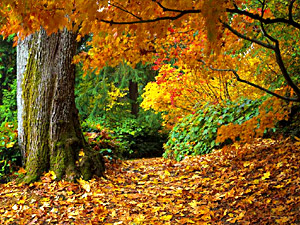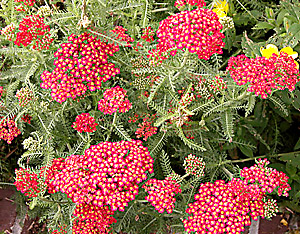Ritusamhara is composed by the illustrious medieval Indian litterateur Kalidasa, portraying in a lyrical manner, the six Indian seasons. The Kavya (English: epic poem refers to artificial Sanskrit literary mode used by Indian court poets prospering from the first half of 17th century A.D.) begins with summer and ends with spring. Kalidasa succeeds here in his lyrical poem in inducing the atmosphere representative of the different seasons, in expressing the delights felt in them by human beings, especially by young lovers. Each canto of Ritusamhara ends with a verse of benediction.
 The Summer - Grishma-Ritu
The Summer - Grishma-Ritu
The predominating theme of the total canto is the searing heat of summer and its impression on human beings and animals. For instance, the verses that describe young lovers are delineated in a picturesque manner, vivid to the eye. They bask in the cool nights lit by moon rays on the terraces of the palace. The young women sample various methods to rekindle the passion of their men who are almost insensible to any longing because of the heat. In contrast to these young lovers, the travellers and their lovers suffer because of separation. The animals suffer much from quenchless thirst and they wholly forget their hostility for other animals. The strong ones do not attack the feeble ones. The weak one bears no fear for the strong ones. The canto ends with a picture of a forest fire.
The Monsoons - Varsha-Ritu
The thunder reverberates, the lighting dashes out. Dark clouds loom heavily on the land. The much-awaited rain arrives. The rivers, marshy and wild, tear down the trees growing on the banks and spill towards the oceans. The peacocks, liberated at last from the heat, dance in a trance. The forests are canopied in fresh green. Their newly born life energises longings of the people. Women, accompanied by lightening and thunder, hurry to their lovers. Although, wives of the travellers are still in a dejected mood, as their better half are engaged by the clouds and the pretty women. The women, who are happy, embellish themselves with flowers, daub themselves with perfume and enter their bedroom where they anxiously await their lovers. The lonesome ones, isolated from their dear ones, sit gazing at the clouds. Like a lover, the rainy season personifies the women with flowers. Afterwards reaching the Vindhya Range, the heavy clouds empty their water on the majestic peaks.
The Autumn - Sharat-Ritu
 Autumn enters like a newly married woman, decked with jewels. Flowers, the moon, the swans, all are covered in white. The rivers are now flowing in a slow motion, proud as if like young women walking regally. The sky dispersed lightly with sparse cloud appears like a king who is being fanned with a white flywhisk. The moon racks the hearts of the lonesome women. A cool breeze moves through the lotus pond and induces mystification in the hearts of the youth. Dark clouds no more are in existence, no thunder and no lightning. The women deck their hair with jasmine flowers and their ears with blue lotus. The sky with the moon and stars dispersed all around appears like an ocean with blooming water lilies and majestic swans. Here, the wandering travellers who see in these flowers and swans the beauty of their women, shed tears.
Autumn enters like a newly married woman, decked with jewels. Flowers, the moon, the swans, all are covered in white. The rivers are now flowing in a slow motion, proud as if like young women walking regally. The sky dispersed lightly with sparse cloud appears like a king who is being fanned with a white flywhisk. The moon racks the hearts of the lonesome women. A cool breeze moves through the lotus pond and induces mystification in the hearts of the youth. Dark clouds no more are in existence, no thunder and no lightning. The women deck their hair with jasmine flowers and their ears with blue lotus. The sky with the moon and stars dispersed all around appears like an ocean with blooming water lilies and majestic swans. Here, the wandering travellers who see in these flowers and swans the beauty of their women, shed tears.
The early winter - Hemanta-Ritu
Its winter! The seeds shoot up, the Lodhra has flowered, the rice is ripe for reaping. Yet there are no lotuses to be seen. The women have to make use of something else other than the lotus to embellish themselves. They use sandalwood paste to paint their faces and to aromatise their hair. Fields and ponds excite the heart of the people. The priyangu plant, now which has turned ripe, is as blanched as a lonely woman. The night witnesses the lovers in tight embrace. The fresh mornings can be viewed in the playful signs of some of the women, signs of last night`s passion play: one is admiring herself in the mirror while she dresses, the other is still sleeping in the warm early morning sun, yet another one is combing her tousled hair.
The late winter: Shishira-Ritu
Life has been regenerated to the houses. Parcels of sugar cane and rice cover the floor. The wind has cooled down, snow is falling; even the moon looks cold. The women, satiated with their love life, pardon their untrue lovers their mistakes. In the nights the lovers sit drinking wine and exciting their passion. In the morning some of them emerge like goddesses, their freshly washed hair caressing their shoulders. Others take off their nightdresses and get ready for a new day. Yet others decorate their faces as the sun comes up and think merrily about themselves.
 The Spring - Vasanta-Ritu
The Spring - Vasanta-Ritu
Spring comes along as a mighty warrior, at the sight of whom the hearts of men flutter. He (Vasanta is personified and considered here to be masculine) beautifies everything he touches - the flowering trees, the water in the ponds. The women embellish themselves with striking dresses, flowers, chains of pearls, bangles and anklets. Even a drop of sweat on their faces looks adorable. Bathing in the presence of their lovers, they are overwhelmed by love. They do away with their heavy winter clothes and dress themselves in thin and pale coloured clothes that are sweet-scented. The cuckoo kisses its mate; the bee cajoles its partner. The flowers on the mango trees brim the hearts of the youth with strong desire; the flowers of the Kurabaka tree, which resemble the face of the beautiful woman, baffle them. The earth canopied in a red dress appears like a newly married bride. The young man, intensely in love, feels as if the song of the cuckoo is killing him. Even the breeze that is circularising this music around infatuates him. Even a `rishi` feels enchanted by these pretty gardens, smitten as he is by the contagious atmosphere, echoing the laughter of the women. Only the traveller still weeps and complains, when he sees the blooming Sahakara trees.



















